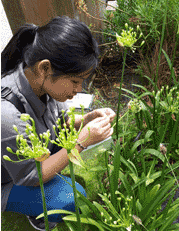The David Colegrave Foundation (DCF) is funding Julie Lin, a biological sciences student at Imperial College London, as part of a plant health undergraduate studentship.
DCF worked with the Royal Society of Biology (RSB) to select a plant health project for its Plant Health Undergraduate Summer Studentship Programme for 2019. The selected project is the life cycle and biology of an emergent pest, the agapanthus gall midge, hosted by RHS Garden Wisley and supervised by Dr. Hayley Jones.
Julie Lin is working at the forefront of research alongside the plant health team. She says: “I applied to this project after I was enticed by the idea of uncovering information completely new to science...Last summer I undertook a placement which involved the rearing of small insects and annelids efficiently within a lab. To do this, I delved into the literature describing the life cycles of these little critters and during this time became increasingly impressed by the fascinating and diverse life cycles of insects. The summer studentship project to elucidate the life stages of the newly discovered agapanthus gall midge brought these ideas together and so piqued my interest…I am already very thankful for this opportunity and I am looking forward to carrying out the experiments which will likely reveal critical information towards the development of control against the agapanthus gall midge.”
The project has got off to a great start. Dr. Hayley Jones said: “We selected Julie for this project because of her enthusiastic and well written application and performance in a telephone interview, where she outlined her biological research skills and experience with entomology. So far, she has proved an excellent student, working very hard and efficiently and making good progress with the project…She has already successfully photographed the pupal stage and deduced that they do not form a cocoon, a key gap in our knowledge that her project was tasked with...We are only a third of the way into the project and Julie has already achieved so much, I look forward to the rest of the project.”
The agapanthus gall midge, Enigmadiplosis agapanthi, causes damage to the popular ornamental plant. The larvae form galls in the flower buds, deforming them and stopping their flowering. The knowledge gained from the project will inform the development and targeting of control options, with the aim of improving the economic stability of Agapanthus breeders and nurseries, and empowering gardeners to protect their garden plants.